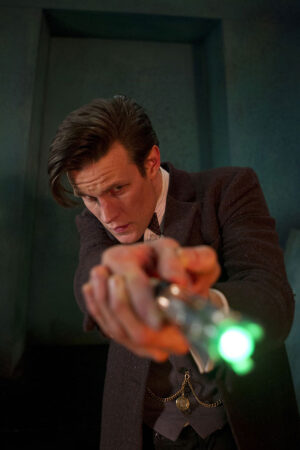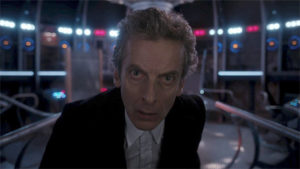The Magic Screwdriver: Does Doctor Who Break Sci-Fi Rules?
Guest contributor Christoph Schwarz searches for Doctor Who’s boundaries.

Over its fifty-plus years, Doctor Who has hosted a number of devices that serve both a fictional and technical purpose. None is more familiar than the sonic screwdriver, a veteran piece of technology to the show that has received some criticism in recent years due to its overuse. There is no denying that the fundamental purpose of the screwdriver is to advance the given plot and to reflect upon the Doctor’s character – as Steven Moffat said, “they didn’t give him a gun, they gave him a screwdriver to fix things.” The sonic screwdriver has become integral to the culture of the show, yet it has attracted a good amount of ire as well. This is where Doctor Who enters a grey zone that is fascinating: a realm of television in which screwdrivers are not only sonic but magical, too.
 The sonic screwdriver may have received criticism over a longer duration, but I would like to explore its implications locally to the most recent few years of the show. A notorious incident that comes to mind occurred in 2013’s “The Rings of Akhaten”. The Doctor, in a standoff with the Vigil, brandishes his sonic screwdriver like a wand and casts off the enemy. Was the solution too simple? Was it not the right solution? The audience is brought to a boundary – a line between separate genres. Some can stomach the infraction better than others, but for some, the apparent genre imposition is too jarring.
The sonic screwdriver may have received criticism over a longer duration, but I would like to explore its implications locally to the most recent few years of the show. A notorious incident that comes to mind occurred in 2013’s “The Rings of Akhaten”. The Doctor, in a standoff with the Vigil, brandishes his sonic screwdriver like a wand and casts off the enemy. Was the solution too simple? Was it not the right solution? The audience is brought to a boundary – a line between separate genres. Some can stomach the infraction better than others, but for some, the apparent genre imposition is too jarring.
Robert Bloch, the renowned author of Psycho, once assessed similar films and illustrated how they were, in fact, from separate genres. His conclusions were based not on what genre the film appeared to be, but on what genre served as a foundation for the film. This is the difference between A Fistful of Dollars and Blazing Saddles. The former utilizes elements of the western style to generate its story whereas the latter simply employs the genre as a backdrop to its predominantly comedic agenda. Likewise, “A Town Called Mercy,” despite its western flavor, is still considered a work of science fiction because, ultimately, it is the science fiction elements that fuel the plot. Doctor Who has entertained audiences with aspects from a wide range of genres, yet it is identified as science fiction.
The demarcation of science fiction and fantasy is a topic of heavy contention across all forms of media. With that in mind, it is not this author’s intention to argue for clear lines or to painstakingly evaluate every instance that Doctor Who may or may not have infracted upon the vague rules of science fiction. At some point, the extremes of science fiction and fantasy reflect on each other: fantasy can become a structured, hard-boiled science and science fiction can explore realms that touch upon the edge of our imaginations. This, of course, will bring to mind Arthur C. Clarke’s last law of science fiction: “Any sufficiently advanced technology is indistinguishable from magic.” So, everything and anything is fair game? Not quite, but there are no easy answers- and sometimes no answers at all- in this grey zone.
 There are few facts that can be ascertained about Doctor Who. No rules, except those that exist within the internal logic of the show or allow the show to be broadcasted publically, exist. (For more on rules within the show, refer to my previous article) There does exist a set of intentions that were laid out during the inception of the show. Looking at the original correspondences with Donald Wilson, we see that the BBC intended to expand its audience by exploring the Science Fiction genre. In early blueprints, Cecil Webber and Sydney Newman tried to develop television that primarily maintained audience’s interest- an essential of drama- and that, secondly, was adaptable to a diversity of scenarios. These plans were eventually recycled for the Doctor Who pitch, in which Newman and Webber state, “they are not writing science fiction.” Considering these initial plans and the show’s recent entrance into the mainstream, it can be asserted that Doctor Who functions on three levels:
There are few facts that can be ascertained about Doctor Who. No rules, except those that exist within the internal logic of the show or allow the show to be broadcasted publically, exist. (For more on rules within the show, refer to my previous article) There does exist a set of intentions that were laid out during the inception of the show. Looking at the original correspondences with Donald Wilson, we see that the BBC intended to expand its audience by exploring the Science Fiction genre. In early blueprints, Cecil Webber and Sydney Newman tried to develop television that primarily maintained audience’s interest- an essential of drama- and that, secondly, was adaptable to a diversity of scenarios. These plans were eventually recycled for the Doctor Who pitch, in which Newman and Webber state, “they are not writing science fiction.” Considering these initial plans and the show’s recent entrance into the mainstream, it can be asserted that Doctor Who functions on three levels:
- As family entertainment.
- As a drama.
- As science fiction.
Newman and Webber’s intentions have become the unspoken expectations of today’s audience. If Doctor Who was to be transformed into a comedy (as opposed to drama) or to cater solely to the below twelve demographic, then it would cease to be Doctor Who because it no longer fulfills these basic expectations.
The idea of emphasizing character in a genre that, up until Doctor Who, sought originality of scientific thought while utilizing stock characters and motives, was a rather revolutionary byproduct of Newman and Webber’s need to produce effective television. As such, it can be assumed that, aside from being a work of science fiction (meaning the show is not wholly accountable to actual, measurable science), a balanced amount of dramatic license is permissible. “Balance” is noted because, when discussing dramatic license with respect to preposterous scenarios expected of science fiction, suspension of disbelief becomes an issue. If the writer of an episode tends to this balance, she or he can create a dramatic arc without debasing the science fiction elements.
 Series 7 perhaps deviated from the science fiction genre more than any other series. It setup the 50th anniversary, culminating in the revelation of a secret incarnation of the Doctor in “The Name of the Doctor.” Yet, the true climax of the series and its finale is a rather peculiar moment: when the Doctor both verbally and physically acknowledges River Song’s data ghost. The scene proceeds without explanation. Even when River asks the Doctor how he could stay her hand, his response only functions dramatically. The shock of such an inexplicable action is suitable for heightening the drama, but how does it avoid becoming a farce? We return to the idea of dramatic license. Throughout Series 7, a number of preparatory deposits are made. These include, but are not limited to:
Series 7 perhaps deviated from the science fiction genre more than any other series. It setup the 50th anniversary, culminating in the revelation of a secret incarnation of the Doctor in “The Name of the Doctor.” Yet, the true climax of the series and its finale is a rather peculiar moment: when the Doctor both verbally and physically acknowledges River Song’s data ghost. The scene proceeds without explanation. Even when River asks the Doctor how he could stay her hand, his response only functions dramatically. The shock of such an inexplicable action is suitable for heightening the drama, but how does it avoid becoming a farce? We return to the idea of dramatic license. Throughout Series 7, a number of preparatory deposits are made. These include, but are not limited to:
- The motif of death, uniting both the first and second halves of the series. Both the mid-series and series finale reach their apex in a graveyard and involve communicating with characters from beyond the grave.
- The “sliver of ice” in the Doctor’s heart – the emotional baggage the Doctor accrues and how it affects his psyche.
- The series premiere and finale explore ideas of perception and deception.
- The series premiere and finale incorporate dreaming, which is united thematically with the aforementioned “death” motif when the Doctor states, “There is a time to live and a time to sleep.” The euphemism may serve to appease the age demographic, but it also suggests that, like dreams, death is a realm unknown to us and is beyond our limited perceptions. This disquieting ambiguity is fundamental to the series.
- The Doctor and River’s relationship provides dramatic tension – the audience needs them to acknowledge each other. The resolution is expected and the positive emotional impact distracts the audience from the means through which it is achieved. By paying dividends earlier, Moffat is able to withdraw later in the episode while maintaining equilibrium. This balance allows the audience to suspend disbelief long enough for the drama to unfold. As the Fourth Doctor said, “The moment has been prepared for.”
Back on Akhaten, it may be difficult to measure the suspension of disbelief objectively, but it can be said that the magic screwdriver’s moment is truly prepared for. The importance of the sonic screwdriver is emphasized in the episode and, even then, the screwdriver merely functions to move the plot from the mummy’s chamber towards the emotional core of the episode: the Doctor’s appeal to the Old God.
 Series 8 appears to have benefited from Moffat’s mandate that scripts avoid the furious pacing typical of Matt Smith’s era and focus on character-driven dialogue instead. The series revisits some of the bleak motives found in Series 7 but expounds on them in a way previously unseen. While the balance appears to be stronger, it does call into question the cost of a more refined drama. Series 8’s mature and unforgiving themes are well supported but do they threaten Doctor Who as family entertainment?
Series 8 appears to have benefited from Moffat’s mandate that scripts avoid the furious pacing typical of Matt Smith’s era and focus on character-driven dialogue instead. The series revisits some of the bleak motives found in Series 7 but expounds on them in a way previously unseen. While the balance appears to be stronger, it does call into question the cost of a more refined drama. Series 8’s mature and unforgiving themes are well supported but do they threaten Doctor Who as family entertainment?
The noted Japanese animator Hayao Miyazaki once said in light of continuing wars and human suffering that, “It felt like children were being born to this world without being blessed. How could we pretend to them that we’re happy?” His creative output does not lie to children, nor does it offer a pessimistic view, but it presents the world as an imperfect place where the decisions people make can have a positive or negative effect- constructive storytelling.
Doctor Who, too, can do more than occupy the Saturday night television slot, but it falls on the viewer to look past the surface and realize that the only boundaries are self-imposed. Only then is Doctor Who more than science fiction or drama or television, but essential storytelling or, in other words, true magic.








